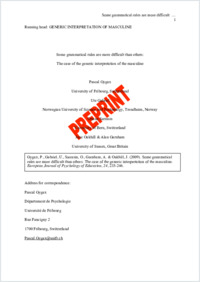Some grammatical rules are more difficult than others: The case of the generic interpretation of the masculine.
- Gygax, Pascal University of Fribourg
- Gabriel, Ute Norwegian University of Science and Technology, Trondheim, Norway
- Sarrasin, Oriane University of Bern, Switzerland
- Garnham, Alan University of Sussex, Great Britain
- Oakhill, Jane University of Sussex, Great Britain
-
2009
English
In this paper we argue that the generic use of the masculine represents a grammatical rule that might be easy to learn but difficult to apply when understanding texts. This argument is substantiated by reviewing the relevant literature as well as the recent work conducted by the GREL Group (Gender Representation in Language) on the interaction between stereotypical and grammatical information in the construction of a representation of gender when reading role names. The studies presented in this paper show that the masculine form used as a generic to refer to persons of both sexes, or to persons of indefinite sex or whose sex is irrelevant, in gender marked languages is likely to be associated with its specific meaning (i.e., masculine refers only to men). This is true even though the generic nature of the masculine is a very common grammatical rule learnt at school. People may have learned this rule and may understand it, but may not readily apply it.
- Faculty
- Faculté des lettres et des sciences humaines
- Department
- Département de Psychologie
- Language
-
- English
- Classification
- Psychology
- License
-
License undefined
- Identifiers
-
- RERO DOC 209011
- Persistent URL
- https://folia.unifr.ch/unifr/documents/303330
Statistics
Document views: 157
File downloads:
- Texte intégral: 222
